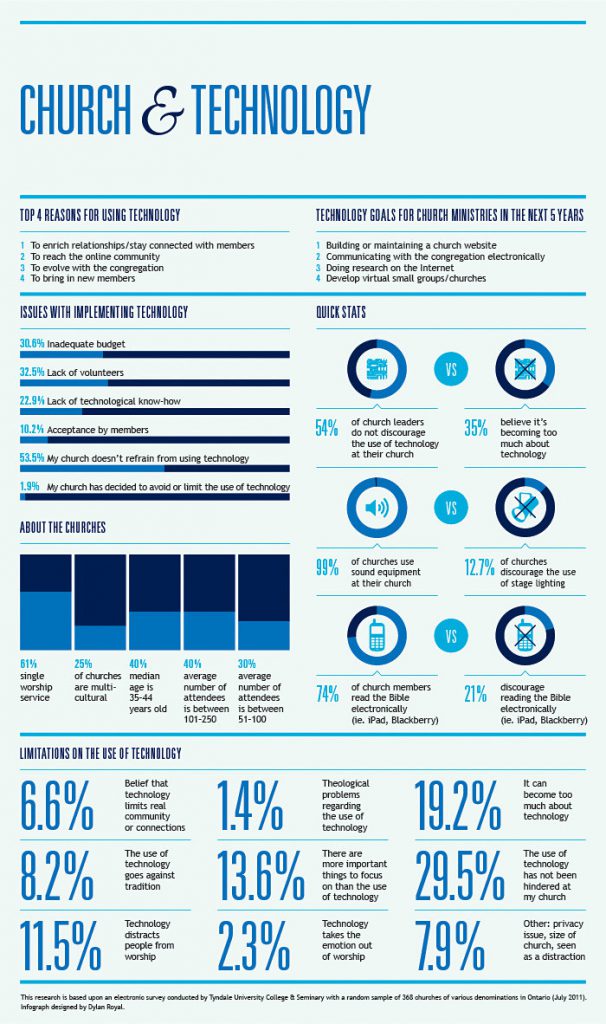Tyndale College and Seminary conducted a survey of 386 churches in the Ontario, Canada area to find out how congregants viewed the role of technology in the churches. Below is the infographic from the article entitled, Church and Technology.

There are some a few interesting tidbits in the data:
- On the one hand 35% believe church is “becoming too much about technology” and 11.5% say technology distracts from worship, but only 1.4% see theological problems with technology usage. To me, it’s interesting that there is little correlation or connection between theology (what we believe about God) and what we think about worship.
- A whopping 84% of church members read the Bible electronically. I really would have expected the number to be lower in church, but I’m guessing this refers to “Sometime in the week”
- Sound equipment is ubiquitous (99% use it). That means it’s not “technology” anymore to 99% of churches.
- One pastor say that technology has “No trade-offs, only benefits.” Seriously? but other pastors acknowledge that technology is not just about right or wrong, it’s about “change” and that’s hard sometimes: “Introducing technology is a change. Change can be difficult. Our services are traditional in character, and there is no great desire to change that basic character.”
Tyndale should be applauded for pushing the conversation on technology, but I really would have liked to see the real data. It’s hard to interpret the numbers without knowing what the exact questions were, how many people answered the questions, when stats are related to pastors vs. congregants (the infographic shows 35% and 19.2% for “too much about technology” – which is which?).
Still, the survey approach shows how varied the responses and outcomes to technology can be. Pastors lament that, “clergy and others to spend more time at their desks and less time pounding the pavement of the community,” and yet we can’t help but feeling like it’s good thing when, “A member/leader in our church was serving in Afghanistan and we were able to include him in some of our services via Skype to encourage him and the church family.”
I think this kind of back and forth is helpful in seeing the pros and cons, good and bad, positive and negative that comes with technology. It helps us avoid blindly criticizing it or blindly diving in, both of which are unhelpful extremes.
Did anything stick out to you in the data?
Anything stick out? Yes: That “technology” apparently is exactly synonymous with “computerized devices and electronic media.” Specifically, “as used in worship.” That’s an important set of matters, but it is only a very narrow subset of “how…churches are interacting with technology, and how they see it changing the church.” It doesn’t surprise me that either those conducting the survey or those responding to it only thought of things like online Bibles and Skype worship services, but it does demonstrate (as one of its unstated results) that our automatic response to the questions of technology in the church is to focus on just one small portion of what those questions really could be, and that we might be making our decisions in that smaller area without ever getting the perspective we might get if we step back and take the long view of both “technology” and “church”.
Even with regard to computers, there are more things going on than PowerPoint sermons.
For example, there wasn’t a church on the planet with a budget spreadsheet 30 years ago. Moreover, not a single pastor in the world probably had a computer in the office at that time (okay, maybe a couple dozen enthusiastic electronics hobbyists). Now, however, I’d challenge you to find many who can successfully do their job- a job which supposedly existed for a couple thousand years before computers- for a single day without access to one. This kind of use of technology- the “how it modifies our everyday practices which leak into the church by virtue of being the normal ways of doing things”- isn’t considered here mostly, except when it directly changes worship practices.
Nor are the giant technology-induced changes in society as a whole, which alter the environment in which the church operates. For instance, the commuter culture and attitude brought about by modern transportation technology makes for noteworthy changes. Any town in the U.S. that was built more than a few decades ago has neighborhood churches all over. I don’t think I’ve _ever_ seen a church building in _any_ subdivision built in the last 20 years. That is a gigantic change in how the church is operating, an ongoing change heavily influenced by technology introduced a hundred years ago but whose effects are still surfacing today.
So this is really only the very tiny tip of a huge iceberg of how technology is affecting, and being used by, the church.